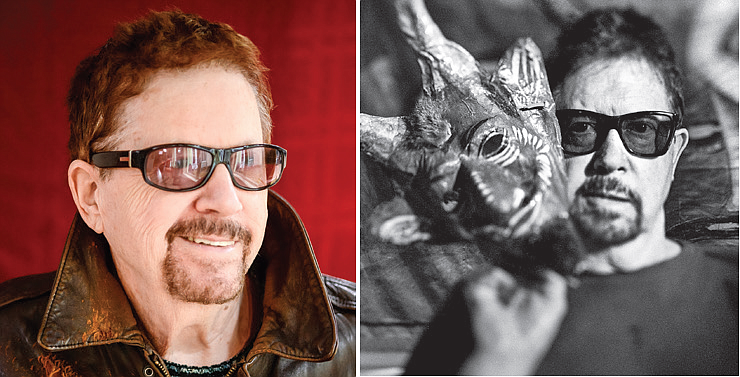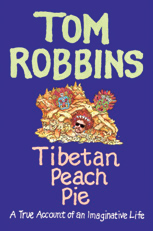Tom Robbins
April 30, 2016 at 9:06 a.m.
In 1970, Tom Robbins moved to La Conner, Washington and it was at his home there on Second Street that he authored nine bestselling books.
But his taste for literature started at a very young age. In his 2014 memoir, Tibetan Peach Pie, Tom writes, “It was almost as if some mad literary fairy, hatched perhaps in a poppy in Oscar Wilde’s garden, had tapped me with her wand as I lay in my cradle, because I fell totally in love with books as soon as I knew what books were…I hadn’t been talking in complete sentences for many months before I announced to my parents that I intended to be a writer. Too impatient to wait until I could spell words and scrawl them on paper, I turned my mother into my private secretary.” In 1975, Tom related to his editor that he would throw tantrums if his mother altered even a single word of his childhood stories. The editor exclaimed, “My God, Robbins, you haven’t changed in forty years!”
Tom Robbins was born in North Carolina in 1932 during the Great Depression. He calls his young self a “hillbilly.” Both of his grandfathers were Southern Baptist preachers, but that didn’t stop Tom from developing a reputation for reckless behavior and mischief from the time he could walk. His mother’s affectionate nickname for little Tom Robbins was Tommy Rotten.
The Robbins family later moved to Virginia where Tom graduated from Virginia Commonwealth University.
Tom’s great success as an author started in 1971 with the publication of Another Roadside Attraction, but he’d had a widely varied life before settling down to the business of writing bestselling books.
In 1953, Tom enlisted in the Air Force after receiving his draft notice, spent a year as a meteorologist in Korea followed by two years in the Special Weather Intelligence unit of the Strategic Air Command in Nebraska. He was discharged in 1957 and returned to Richmond, Virginia, where his poetry readings at the Rhinoceros Coffee House led to a reputation among the local bohemian scene.
He then resettled to the Northwest. “Ever since my troop ship sailed out of Yokohama Harbor in late 1955 I’d longed to return to Japan,” writes Tom. In 1962, Tom moved to Seattle to seek an M.A. at the University of Washington’s Far East Institute. During the next five years (minus a year spent in New York City researching a book on the painter Jackson Pollock) he worked for the Seattle Times as an art critic.
In his memoir, Tom writes: “Throughout all those diversions – the art columns, the happenings, the radio show, rock concerts, protest marches, pot parties, etc. – the old literary pulse continued to throb in my blood…A novel had announced itself.” But he needed to pry himself from Seattle’s art community to tackle the book. He moved to the tiny hamlet of South Bend, Washington with its cheap living quarters and few distractions. Another Roadside Attraction was the result.
Tom has described South Bend as a waterfront village physically not unlike La Conner. During his time in Seattle, he had discovered La Conner through a mushroom-hunting friend. When he finally found a place in La Conner he could afford, he moved there. He lives there still.
Tom Robbin’s other internationally bestselling works include Even Cowgirls Get the Blues, Still Life With Woodpecker, Jitterbug Perfume, Skinny Legs and All,Half Asleep in Frog Pajamas, Fierce Invalids Home From Hot Climates, Villa Incognito, Wild Ducks Flying Backward and B Is for Beer. Even Cowgirls Get the Blues was made into a movie by Gus Van Sant in 1993, starring Uma Thurman and Keanu Reeves.
Jason Sheehan wrote a review of Tom Robbins’ memoir, Tibetan Peach Pie (2014), for NPR. It concluded: “So, going in, you gotta love Tom. You gotta be itching to know about his first acid trip, his feelings on tomato-and-mayonnaise sandwiches and his long list of ex-wives. You gotta imagine yourself washed up on a barstool in La Conner, Washington, trapped by a typhoon or a toad-rain or worse, and fortunate enough to find yourself sitting next to the now aged cosmic fool as he starts to talk and tell you the tales of how he got from Blowing Rock, North Carolina to here, consorted with artists and idiots, drank some beer, ran away with the circus, predicted the weather, loved some women, sired some children, traveled the world and, somehow, found the time to write a few books along the way.”
In Tibetan Peach Pie Tom writes of developing an interest in genealogy. He hired a professional and learned he was a direct descendant of Daniel Defoe. To his far greater delight, the genealogist “discovered a few odd nuts dangling from the old family tree…” including his great-grandmother Polly Elrod, “arguably the first Pop artist in America.” (Polly lived to ninety-one and decorated her one-room log cabin with a lifetime of the tin emblems from her tobacco “chaws.”)
The father of three sons, Tom Robbins lives with his wife, Alexa D’Avalon, and their dog, Blini Tomato Titanium, in La Conner. Over the course of his writing career, the internationally bestselling author has given readings on four continents. His writing has been described as wildly poetic with strong social and philosophical undercurrents and scenes extrapolated from carefully researched bizarre facts. Despite his success, he would probably enjoy being considered one of the nuts from his family tree. For eight years he was an enthusiastic participant in Seattle’s SPAM carving competition, serving as judge. He has also hosted an annual mayonnaise tasting, often with more than 20 international varieties, at his home in La Conner. Tommy Rotten lives on.
MORE INFORMATION
Tom Robbins will read from his memoir, Tibetan Peach Pie, on May 18 at 7:30pm as part of an evening of storytelling at Town Hall Seattle for KPLU public radio’s news and culture magazine, Sound Effect. Other participants will include Seattle photographer Tim Durkan, Grammy Award-winning singer/songwriter Kimya Dawson and Seattle writer, critic and storyteller Melanie McFarland. Sound Effect is broadcast every Saturday morning at 10am on KPLU 88.5 FM. For information on attending the Town Hall Seattle event, visit www.townhallseattle. org/event-listings or call 206-652-4255.
The evening is part of the “Save KPLU” campaign. KPLU is working to raise $7 million for KPLU to become an independent, community-licensed station. All donations are tax-deductible. For information about “Save KPLU,” visit KPLU.org or call 1-800-677-5758.






